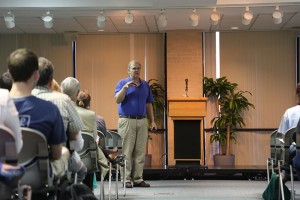
Robby Hirst | Lariat Photographer
Reporter
A dinner swipe at Penland costs $9.25. Millions of people in the world could not afford it.
“Eight hundred and thirty six million people live on $2 a day,” Dr. Jayakumar Christian said during a lecture Monday in Truett Theological Seminary.
He addressed the issue of poverty as part of the Rethink Missions Conference.
Christian is the National Director of World Vision India, an agency that invests in the lives of children.
Dr. Diana Garland, dean of Baylor School of Social Work, said Christian leads a team of 1,800 community workers and staff reaching more than 5,300 communities through programs addressing issues such as infant mortality, hunger, education and child labor.
Christian is the author of “God of the Empty Handed: Poverty, Power, & the Kingdom of God.” He also has a doctorate in World Missions from Fuller Theological Seminary.
Dressed in light brown traditional Indian garb, Christian addressed a crowd of students, faculty, community leaders and missionaries.
Christian said he had more questions than answers, but he sought to address the issue of the church dividing faith and social work.
“The church has created the divide and now we have conferences to bring it back together,” he said, which brought laughs from the audience.
Christian said secular organizations could not truly address poverty because they lack the depth of the Christian faith.
“Poverty, by its very nature, demands a response that is marked by spirituality,” he said. “Bible-based faith has a unique advantage. There is no way to respond to poverty except engaging in a spiritual way.”
Christian also mentioned the causes of poverty.
“The church needs to address this tendency of the powerful to play God by communicating that the power belongs to God,” he said. “Dependence on God is a daily discipline.”
People should be able to look at missionaries, he said, and think the missionaries could not have been effective without God.
Another issue Christian discussed is when people tie their poverty to their identity.
“When they say ‘I was born this way,’ you hit a wall,” he said. “But church is uniquely placed to change their identity.”
Christian said the church can address and clarify a person’s identity.
“Value them because they are made in the image of God,” he said.
Christian also said the kingdom of God is not only revealed through evangelism but he also said transparency and integrity in mission work is imperative.
“No sneaking in of the gospel, no back-door methods,” he said.
Another helpful method to address poverty that Christian suggested was the use of intentional conflict.
He told the story of a doctor in western India who intentionally created conflict by only operating on patients on days which they believed were superstitious in order to challenge their beliefs. Christian then told the audience to look at Luke 1 and Luke 2.
“Everyone is upset with Jesus,” he said. “Jesus intentionally created the conflict. We can use conflict to transform.”
Christian said he encourages people to study their Bibles.
“It is so important that we are good students of the word of God,” he said. “Do not outsource to theologians.”
He said in order for Christians to be good teachers, they must be good students first.
“We can’t be hurt people expecting to heal others,” he said. “Healed people heal.”
Belton senior social work major Tori Plunk said she plans to travel overseas to share the gospel and bring physical healing and spiritual hope to poor communities.
“I agreed with Christian when he said we don’t have to throw the gospel at people,” she said. “We can demonstrate the kingdom of God through making relationships people and loving them. The church does try to separate helping people physically and spiritually, but a holistic view can inspire so much hope.”
Garland, who introduced Christian before his talk and prayed at the end, elaborated on Christian’s message. She said Christians need to work together because no single disciple has all answers.
“We need to approach our callings with humility,” Garland said.
Garland said Christian will be speaking again today for those who want to hear more.
“It is a scavenger hunt conference,” she said. “If you find it, you can attend. It began in Chapel, it will be in the business school and Truett. We want to make the campus aware of our attempt to rethink missions.”



